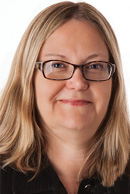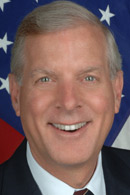Lawrence University political scientist Claudena Skran discusses two approaches for combining thought and action —the rocket ship and the catalyst models — in the final address in Lawrence’s 2012-13 convocation series.

Skran, professor of government and Edwin and Ruth West Professors in Economics and Social Science, presents “Liberal Arts Education: A Catalyst for Thought into Action” Thursday, May 23 at 11:10 a.m in the Lawrence Memorial Chapel at the college’s annual Honors Convocation. She also will conduct a question-and-answer session at 2:30 p.m. in the Warch Campus Center. Both events are free and open to the public.
Skran is the fourth recipient of Lawrence’s annual Faculty Convocation Award, which honors a faculty member for distinguished professional work.
According to Skran,the rocket ship approach provides a foundation for students to help them “blast off” into life in hopes they will fly high and achieve much. This model, which sees thought and action as separate stages of development, has worked for much of the last half century, but a lack of flexibility and entrepreneurism is threatening its future.
In the catalyst model, liberal arts colleges provide the necessary structure and special ingredients needed to accelerate reactions, which produce unexpected, sometimes unplanned, results that are largely student driven and bring “thought” and “action” closer together.
The annual Honors Convocation publicly recognizes students and faculty recipients of awards and prizes for excellence in the arts, humanities, sciences, social sciences, languages and music as well as demonstrated excellence in athletics and service to others. Students elected to honor societies also will be recognized.
A specialist in international relations, with research interests in refugee issues, the United Nations and non-government organizations, Skran joined the Lawrence faculty in 1990. She is the author of the book “Refugees in Interwar Europe: The Emergence of a Regime.”
In 2005, Skran was awarded a Fulbright Scholars grant to study the role of NGOs in refugee resettlement in post-civil war Sierra Leone. She has subsequently made numerous return trips to Sierra Leone, often with Lawrence students for research projects. She is the founder of the NGO KidsGive, a scholarship program that supports nearly 500 students at three different schools in Sierra Leone.
A 1983 Rhodes Scholar, Skran earned a bachelor’s degree in social science from Michigan State University and her master’s and doctorate degrees in international relations at Oxford University.
About Lawrence University
Founded in 1847, Lawrence University uniquely integrates a college of liberal arts and sciences with a nationally recognized conservatory of music, both devoted exclusively to undergraduate education. It was selected for inclusion in the Fiske Guide to Colleges 2013 and the book “Colleges That Change Lives: 40 Schools That Will Change the Way You Think About College.” Individualized learning, the development of multiple interests and community engagement are central to the Lawrence experience. Lawrence draws its 1,500 students from nearly every state and more than 50 countries. Follow Lawrence on Facebook.
